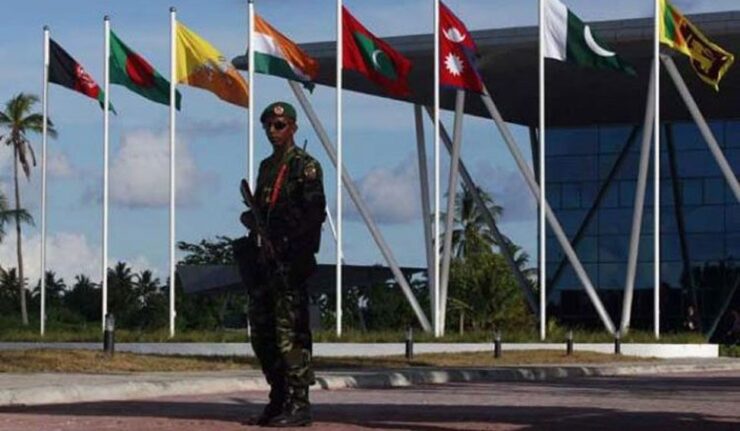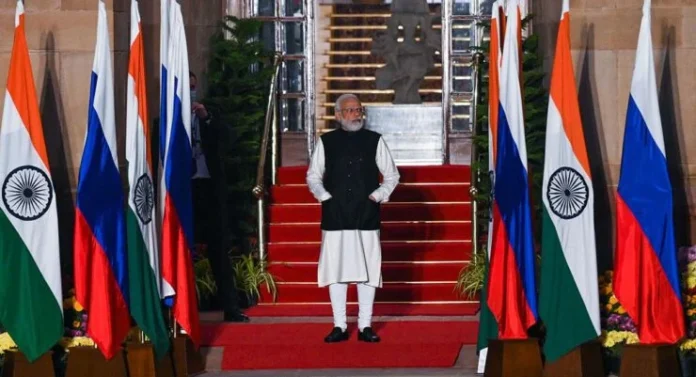“You can change friends, not neighbours” was famously said by former Prime Minister of India Atal Bihari Vajpayee. Security is one of the most important issues which affected and continues to affect the course and trajectory of any nation-states’ foreign policy and strategic decision making. In the context of India security is inevitably a matter of high priority for the foreign and domestic policy mandarins in New Delhi. There is little doubt that India is the preeminent power in South Asia ever since the 1990s when it underwent a massive economic boom thanks to the 1991 industrial and economic reforms.
Being the most powerful country in the region in terms of economy and military India undoubtedly has several key contemporary security concerns in the South Asian region. Henry Kissinger in his book ‘The World Order’ had argued that security and geopolitics trumps other considerations and that is exactly what is happening with India.
Security of India is intimately linked with the geographical position of India. India shares 15,200 km long border its neighbours and naturally security of these borders is one of top concerns for the policymakers of New Delhi. To begin with, India is bound by Pakistan and Afghanistan in the northwest and west, Bangladesh, China in the east and north and Myanmar and Nepal in the south-east and north-east respectively. Among some of the most pressing of New Delhi’s contemporary security concerns is the increasingly threatening menace of Islamist terrorism emanating from Pakistan and Afghanistan
While this threat is not new and has been a headache for India ever since the 1980s when Pakistan covertly pumped in money, weapons and radical Islamist literature to oust the Soviet Union from Afghanistan through western help, the current situation is somewhat more concerning.
Pakistan is the ultimate culprit of spreading radicalism not only in India but throughout South Asia. Its military-jihadi establishment what Tilak Devasher calls ‘miltablishment’ is the primary culprit behind India’s security concerns. Ever since it sponsored the ethno-religious insurgency in the Kashmir valley in the 1990s Pakistan has been hellbent on hurting India by ‘bleeding India with a thousand cuts’.
Anju Gupta, an IPS officer and columnist for the Indian Express who regularly writes on security issues vis-a-vis India and the Af-Pak region has argued in several of her opinion pieces that Pakistan has been riding high on the back of the egregious Taliban victory in Afghanistan back in August 2021 and has been calling the shots in terms of dictating the formation of the Taliban government and how it should export clandestinely the jihad on a global scale and that the first target on the Taliban-Pakistani’s radar is India. What is more concerning is the fact that the Taliban cabinet comprises several members who have in the past been known for attacking Indian installations and have been active in promoting anti-India activities on Afghan soil.
Radicalization is an ever-present threat and the busting of terrorist modules in recent months across the country by NIA and the aggressive anti-militancy operations by the Indian armed forces point to how Pakistan has been desperately training, financing and pushing jihadi terrorists on our soil.
Radicalization also poses a lethal security threat from Bangladesh as well, the attacks on secular bloggers, intellectuals by extremists and the anti-India and anti-Hindu rhethoric which is evident from vandalization of Hindu temples during Durga Puja celebrations last year point to how the radicalisation can produce a counter fear psychosis among the Hindus of India which can prompt more virulent anti-Muslim feelings in India.
What is more concerning from the domestic point of view is that the security concern is not merely on the protection of borders but also to prevent the social atmosphere of the country from being vitiated by toxic communalism. The spread of Hindutva characterized by intense contempt for minorities especially for Muslims and their routine otherization has contributed to a sense of alienation and dissatisfaction among the Muslim citizens of India, the mass protests against the laws like NRC and CAA is evident of the palpable discontent among the Muslim masses. While this issue may seem a bit of digression from the security situation, but there is a direct correlation between as the alienation of the minorities and external security, the alienation may aid the effort of the radical elements to undermine the social fabric of India and vitiate the peace and tranquility of the country.
Another crucial aspect of India’s security concerns is the possibility of narco-terrorism being vigorously promoted by Pakistan and Afghanistan. Afghanistan is the largest producer of opium and other illicit psychotropic substances like heroin, brown sugar etc in the world. Pakistan which calls the shots in Afghanistan can very well funnel drugs via the Gwadar port and other ports of Pakistan to India and has been trying to do so for a while. The seizures of loads of drug consignments off the coast of Maharashtra and Gujarat has revealed how narco-terrorism is being promoted by the Pakistan deep state and its Taliban comrades to disturb the security of India’s border states.

The next and perhaps the most important security concern is related to our gargantuan neighbour-China. Relationship with China has been rocky for a while. However starting from June 2020 after the Galwan incident Indo-China relations have nosedived to its lowest point since the 2017 Doklam standoff. The primary contemporary security concern for New Delhi vis-a-vis China is Beijing’s irredentist claims with regard to the territory of India. For China this is nothing new, it is locked in several territorial disputes with its neighbours.
The first major issue with China is the undemarcated nature of the borders with China which is known as the Line of Actual Control (LAC), India shares 3,933 km long border with China and the nebulous nature of the border with China is responsible for the repeated clashes with the Chinese troops. In fact the 1962 border war with India was precisely because of this territorial dispute. This security dispute with China is not new, it is rooted with history.
It is embedded in the intepretation of what constitutes the McMahon line. This line was drawn at the Shimla Convention, a conference held in 1913-14 in the north Indian city of Shimla between the UK(represented by Sir Henry McMahon), China (the Republic of China) and Tibet. While China took part in the conference, it did not sign the resulting accord, which is one reason why the People’s Republic of China does not recognize the legitimacy of the McMahon line. As a result of which Arunachal Pradesh which covers 83,743 square kilometres in the northeast of the sub-continent and is under India’s actual administration has become a disputed territory between India and China. Another large area in dispute is the 37,555 square kilometres Aksai Chin in the northwestern Kashmir region which is under China’s actual administration. China has and continues to maintain that Arunachal Pradesh is “South Tibet”, part of Tibet autonomous region.
The territorial dispute with China over Arunachal Pradesh and recently in Ladakh has resulted in a massive mobilization of troops and heavily armoured vehicles on both sides since May 2020. So far numerous rounds of talks at the levels of the military and diplomats have resulted in de-escalation of tensions at several of the the fingerpoints, but India’s main demand- the restoration of the status quo i.e. the status of the Indo-China border along Ladakh and parts of Arunachal Pradesh to April 2020 continue to remain elusive for New Delhi.
Another pressing concern vis-a-vis China is the emerging Taliban-China-Pakistan axis. China was one of the few countries to keep its embassy in Afghanistan open when the Taliban assumed power. Although Beijing has not officially recognized the Taliban regime, yet there is little doubt that Beijing has made no secret of its dealings with the Taliban. Hence for the purpose of destabilizing India, Pakistan and China could indeed make use of the Taliban to threaten India’s borders by financing and funneling terrorists on Indian soil.
The Chinese security threat looms large as far as the dragon’s surging influence on India’s neighbours are concerned. A pressing concern for New Delhi is the expanding sphere of influence that China is exerting over New Delhi’s traditional allies such as Maldives, Nepal and Sri Lanka. In contemporary time, Abdullah Yameen the former Maldivian president who was pro-China is eyeing a comeback and has embarked on anti-India tirade alleging in speeches that the India is establishing a large military presence in Male.
Sri Lanka is another area of concern, the stunning victory of Gotabaya Rajapaksa and his brother brought back renewed fears among the elites of New Delhi about a pro-China regime. However Sri Lanka has paid a heavy price for following a pro-China foreign policy as the country grapples with its worst economic crisis in decades which many experts say is attributed to a large measure to China’s debt trap diplomacy.
Nepal is another key area where India’s security concern is high, China has tremendously increased its influence among the Nepali elite so much so that it is a part of Beijing’s BRI and since the 2015 Nepal blockade that India imposed, Nepal has been miffed at India to the extent of engaging in a territorial dispute over Uttarakhand’s districts of Limpidyura, Lipulekh and Kalapani. A pro-China regime in Nepal is detrimental for India as both countries share civilisational ties and porous borders. China is following a string of pearls strategy to encircle India and has been doing so to undermine Indian influence in its geopolitical backyard.
Another pressing threat that China poses to India from its security perspective is destabilizing the relative peace and tranquility of India’s north-eastern borders. India shares a 1458 km long border with Myanmar and several of the north-eastern militant groups have their bases in Myanmar. Ever since the Tatmadaw overthrew the democratically elected government of Aung San Suu Kyi in a coup in February 2021 and assumed control, ties with China and the Myanmarese military has deepened. The deadly crackdown by the Tatmawdaw on protestors against the coup has triggered a refugee crisis which has resulted in several north-eastern states like Mizoram, Nagaland, Meghalaya giving shelter to the refugees.
From the security point of view, China has in the past financed the militant groups which wrecked havoc in states like Assam, Nagaland, Manipur. Attempts are being made to revive militancy in the north-east, the recent attack on an Assam rifles convoy and the death of a colonel and his family plus several army personnel has highlighted the high-handedness with which the militant groups are operating. Although it is extremely difficult to prove that China is directly involved in these activities, yet there is little doubt that Beijing is involved in these nefarious activities to disturb India’s security along its north-eastern borders.
Keeping that security threat in mind, New Delhi has so far desisted from directly criticizing the Tatmaudaw’s actions and has called for the end to violence and has urged peaceful resolution of the problem. Therefore India is treading quite carefully so as not to antagonize the military regime in Myanmar and push the former in into having deeper ties with Beijing.
Conclusion
In realist terms security threats stem from the anarchical nature of the international system. Keeping that thinking in mind, India has under the Modi government followed a pragmatic and practical policy towards its neighbours. The way New Delhi has dealt with Pakistan, China etc. over issues related to territorial dispute highlights that New Delhi won’t desist from using force and diplomacy as and when required.
Carl Von Clausewitz, the Prussian military general and strategist said, “Pursue one great decisive aim with force and determination”. Therefore there will be numerous hurdles for India in its quest for becoming a great power but India needs to pursue that aim with a strong determination without budging under pressure.
– The writer is currently working as a Research Associate at Defence Research and Studies (dras.in) and is a columnist. The views expressed are personal and do not necessarily reflect the views of Raksha Anirveda
–The writer is currently working as a Research Associate at Defence Research and Studies (dras.in) and is a columnist. The views expressed are personal and do not necessarily reflect the views of Raksha Anirveda






